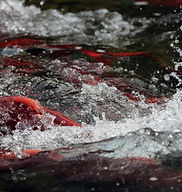Climate Adaptation and Implementation Plan for the Norton Bay Watershed
- Norton Bay Watershed Council

- Jul 23, 2025
- 2 min read

Climate Stressor
Native Villages in Alaska are facing challenges due to climate change. The subsistence food sources, as well as the jobs they depend on for income are being affected by climate change and industrialization. Coastal erosion, raising temperatures, altered ice flow, changes in water and river levels, combined with mining and related industrial development, are affecting the subsistence lifestyle many villages depend on.
Action and Outcome
The Village of Elim, teaming up with the Norton Bay Watershed Council, participated in the Climate Solutions University program in 2013 to develop an adaptation plan for the Norton Bay watershed.
The finding and recommendations of that plan will inform adaptation planning for the larger Norton Sound region and throughout Alaska.
The training curriculum included monthly educational webinars, face-to-face meeting in Nome Alaska and interactive conference calls along with a series of tools and resources that included planning worksheets, checklists, analytical matrices and an adaptation plan template.
At the end of the 12-month training the villages were able to develop plans and outline adaptation strategies for future action locally and regionally.
Federal Tool and Services Used
BIA Tribal Climate Resilience Funding was used to develop a training program and plan implementation through an adaptive management process.
Intergovernmental Panel on Climate Change 2007. Synthesis Report. Contribution of Working Groups 1, 2, and 3 to the fourth Assessment Report of the Intergovernmental Panel on Climate Change [Core Writing team, Pachauri, R.K., and Reisinger, A. (eds)] Geneva, Switzerland.104 pp
National Resource Council. 2013. Climate and Social Stress: Implications for security Analysis. Washington, DC: The National Academics Press
US Army Corp of Engineers.2013. Alaska Deep-Draft Arctic Port System Study. (Link)
United States Environmental Protection Agency.2012 An assessment of Potential Mining Impacts of Salmon Ecosystem of Bristol Bay, Alaska Vol. 1, EPA 910-R-004a
Download NBWC's 'Climate Adaptation and Implementation Plan for the Norton Bay Watershed' by clicking here.








Comments